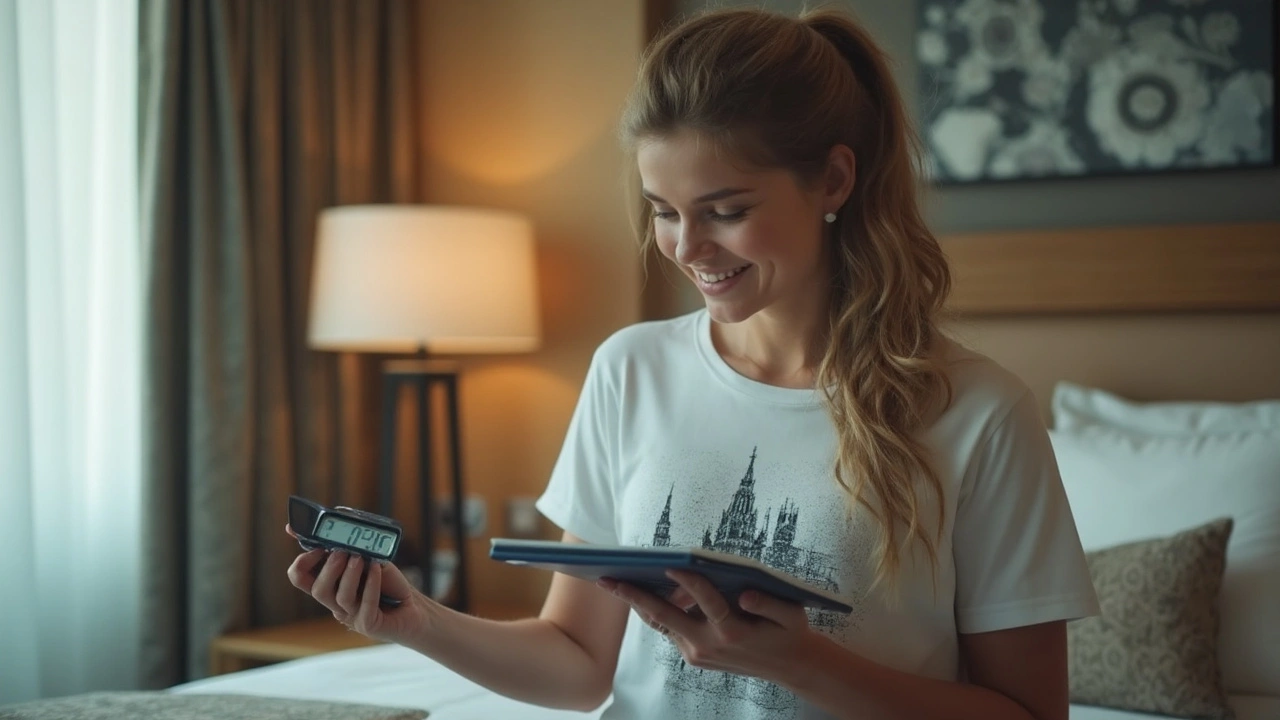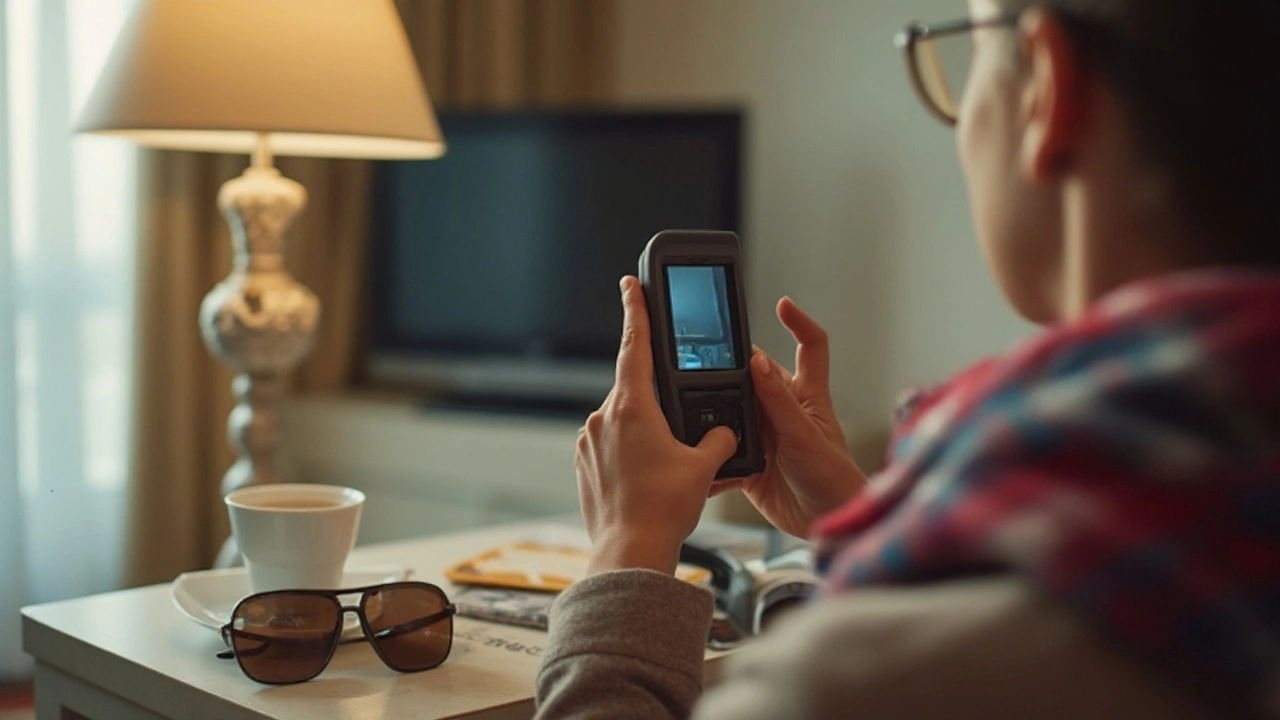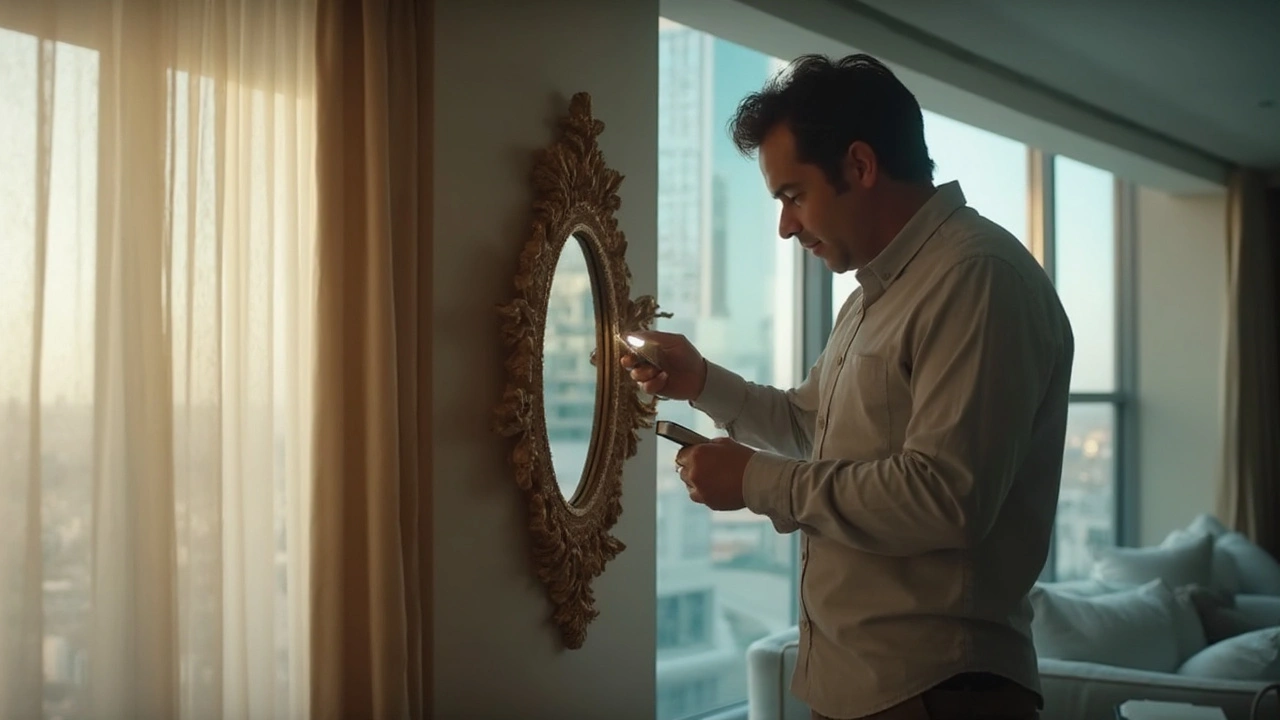Staying safe in a hotel, especially in a city as lively as Dubai, means paying attention to more than just the minibar prices. Hidden cameras are not just an urban myth here—they’ve popped up in hotel rooms, apartments, even inside hairdryer holders and air purifiers. Sound paranoid? Not really, especially for women in the escort business who have every reason to protect their privacy.
If you’re walking into a room and thinking, "Does anyone actually hide cameras in these places?"—the answer is, unfortunately, yes. The good news is you don’t need million-dirham gadgets or spy training to check for them. Simple tricks like scanning for out-of-place objects or using your phone’s flashlight can do the heavy lifting. Want to keep it low-key? Most checks can be done in less than five minutes—right after you dump your bags and peek at the throw pillows.
- Why Hidden Cameras Are a Real Concern
- Where Hidden Cameras Usually Hide
- Quick Visual Checks That Work
- Easy Tech Tricks—With or Without Apps
- What to Do If You Find Something Suspicious
Why Hidden Cameras Are a Real Concern
Hidden cameras in hotels are no longer just something you hear about on dodgy blogs—they’re part of real headlines from Dubai and around the world. In the past five years, reports of tiny cameras found in rental properties and hotels have shot up. Just scroll through travel forums or news sites: cases of guests finding pinhole cameras inside smoke detectors, alarm clocks, or even inside wall sockets keep making waves.
Why should you worry? Cameras can record everything without you ever knowing, and in cities with a buzzing nightlife, like Dubai, hidden camera incidents are a nightmare for privacy. It can mean footage winding up online or used for blackmail, which is especially risky if your work requires discretion.
Check out some real-world numbers below—the problem isn’t as rare as it sounds:
| Year | Hidden Camera Cases Reported (UAE) | Cases Reported Globally |
|---|---|---|
| 2022 | 14 | 183 |
| 2023 | 22 | 241 |
| 2024 | 19 | 198 |
The tech is cheaper and easier to hide than ever. For less than the price of dinner at the Burj Khalifa, someone could buy a camera that streams video straight to their phone. These gadgets can look just like a USB charger, a pen, or even a regular-looking clock on the nightstand.
And it’s not just about embarrassing videos—your personal info, daily routine, and private conversations might be at risk. Many countries, including the UAE, take this seriously, but not every hotel owner or guest plays by the rules. Being aware and checking for cameras is just smart travel.
Where Hidden Cameras Usually Hide
It’s wild how tiny today’s cameras are, and hotel rooms in Dubai are not immune to this trend. The people who hide them don’t go for obvious spots—they choose everyday objects and blend the gear into familiar scenes. You’d be surprised where they show up, especially if you don’t know where to look.
Based on security experts and real news reports, here’s a rundown of the most common hideouts. These aren’t guesses—these are places cameras have been actually found:
- Smoke detectors: People rarely inspect ceiling fixtures, but cameras can fit inside fake detectors or beside real ones.
- Clocks and digital alarm radios: Anything with a little glass face or a display panel is a potential hiding spot.
- TVs and remote controls: Some cameras peek through little holes meant for IR sensors. Check for extra wires or anything that doesn’t belong.
- Power outlets and chargers: You’ve probably seen those "USB charging bricks" online with hidden lenses. They show up in outlets or just plugged into sockets.
- Air conditioners and vents: Grills, louvers, and slots—cameras use these as both hiding spots and fields of view.
- Bathroom accessories: Shavers, hairdryers, tissue boxes—even screws with weird shiny heads might hide lenses.
- Mirrors: If a mirror is oddly placed or seems double-layered, it could be a two-way mirror with a camera hidden behind it.
- Lamps and ceiling lights: Look for pinhole openings or new fixtures that don’t match the rest of the room’s vibe.
Don’t ignore less obvious places if you want to avoid hidden camera surprises. Always check anything that’s angled directly at the bed, shower, or seating area. The trick is to trust your gut—if something looks off, give it a closer look.

Quick Visual Checks That Work
Before you kick back on that perfectly made hotel bed, it’s smart to do some quick checks. You don’t need spy skills—just a sharp eye and the guts to act on your instincts. The big fear for anyone in the hidden camera debate is devices disguised as normal room items. Here’s what to look for, plus some stats to keep you on your toes.
- Check smoke detectors: These are common camera hiding spots, especially above the bed and in bathrooms. If you see a second detector or one pointed somewhere odd, be suspicious.
- Look at alarm clocks and digital radios: Cameras can hide behind tinted screens or inside charging ports. If the placement feels weird, or there’s more than one item doing basically the same job, they deserve a closer look.
- Check out air vents or air purifiers: A tiny pinhole facing into the room? Not normal, and it’s a favorite spot for voyeurs.
- Light fixtures and picture frames: These can be tampered with or swapped out entirely. Cameras are often set into the front or corners of frames or behind lamp shades.
- Mirrors: Hold your finger up to the mirror. If there’s no gap where your reflection touches your finger, it could be a two-way mirror. This doesn’t happen often in hotels, but better safe than sorry.
If you want stats, a 2023 survey by a major travel safety group found that 11% of business travelers reported finding hidden cameras or listening devices in international hotel rooms. That means it’s not just your imagination.
| Common Hiding Spot | % of Reported Incidents |
|---|---|
| Smoke detectors | 28% |
| Alarm clocks/chargers | 22% |
| Vents/AC units | 18% |
| Picture frames/lamps | 16% |
| Other (TVs, bathroom) | 16% |
It’s not about trust issues—it’s about being smart. If something in the room doesn't look like it belongs, take a photo with your phone, use the flashlight, or call the front desk. No one will judge you for wanting peace of mind.
Easy Tech Tricks—With or Without Apps
Nothing gets people more paranoid than trying to figure out if there’s a hidden hidden camera nearby—especially if you have no high-end equipment or tech savvy. But honestly, your smartphone does half the work for you. Even if it’s not the latest model, you’ve got all you need right in your pocket. Here’s how anyone can level up their room-check routine without looking like a secret agent.
- Camera and Flashlight Trick: Turn off the room lights and slowly shine your phone’s flashlight around. Pay close attention to reflective surfaces. Camera lenses—no matter how tiny—tend to bounce light right back, creating a little glint. Try this on clocks, smoke detectors, air con vents, or weird wall hooks.
- Test the IR: Some hidden cameras use infrared (IR) for night vision. Most smartphone cameras (especially the front one) can catch IR lights. Fire up your selfie camera and wave it in front of things like digital clocks or routers—if you spot mysterious, flickering red or purple dots, you might be looking at an IR emitter.
- Hidden Camera Detector Apps: There are loads of free and paid apps that claim to sense unusual hardware or spot hidden wireless signals. Are they perfect? Not really, but they can scan for nearby devices running on Bluetooth or WiFi. Popular picks are 'Fing', 'Hidden Camera Detector', or 'Glint Finder' (Android). Try a couple to see which one works best with your phone—just don’t expect instant James Bond results.
- Check for Strange Wi-Fi Networks: Open up your WiFi settings and scan for odd network names—sometimes hidden cameras run off their own WiFi. If you see anything with camera (like 'IPCAM' or 'CAMLIVE'), or just a random string that looks out of place, make a note. Disconnected networks can be a red flag.
- Listen for Unusual Sounds: Not really an app, but phones with sensitive microphones can help you hear faint buzzing or clicks. Place your phone near electronics in the room and record a minute of audio. Then listen back—if there’s a weird hum or electrical snapping, you might be onto something.
Don’t want any apps? You can get by with just your phone camera, flashlight, and some curiosity. Keep it simple, move slow, and trust that if something in the room feels off, it’s worth taking a closer look.

What to Do If You Find Something Suspicious
Okay, so you’ve spotted something that feels off—maybe a clock that’s oddly angled at the bed, or a smoke detector with a blinking light. Don’t panic, but don’t ignore it either. Your privacy and safety in a hotel, especially as a guest in Dubai, matter a lot. Here’s what you should do if you think you’ve found a hidden camera or recording device.
- Don't touch or remove the device right away. It’s tempting, but don’t yank it out or smash it. Hotel security cameras—or even real ones for security—can get you in trouble if removed or destroyed. Snap a photo for evidence, but hands off for now.
- Document everything. Take several clear photos or a short video with your phone showing where and how you found the device. This record helps if you need to talk to hotel staff, management, or—if things get serious—the police.
- Reach out to hotel management. Call or visit the front desk immediately and show them what you found. Reputable hotels in Dubai take these reports very seriously. Ask for a different room or even a hotel transfer, especially if you felt creeped out.
- Consider reporting to local police. If the hotel isn't helpful, or you’re still uncomfortable, go to the nearest police station. Dubai has specific laws against hidden cameras invading privacy, and authorities will usually act fast. Bring your photos and any other proof you have.
- Protect your privacy moving forward. Make a mental note of the object and its location. If you move to a new room or hotel, check similar spots. Swap rooms if anything else feels off—trust your gut.
- If you’re an escort or involved in sensitive work, let your agency or contact know what happened. Some agencies also have local support contacts who can help mediate or guide you through what to do next.
Hidden devices in hotels aren’t supposed to be common, but in a city with flashy cameras on every corner, it pays to be careful. Take every suspicion seriously, and act fast to stay in control of your hidden camera worries.
